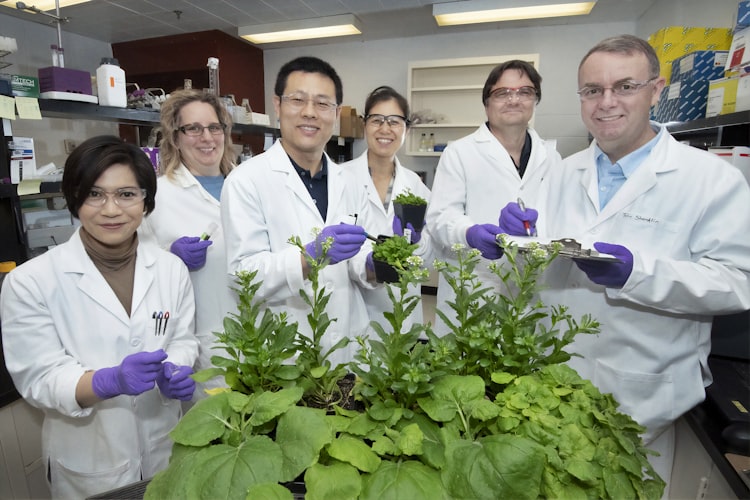Production of virus Free Plant
Techniques to Eradicate viruses
Most of the propagated by vegetative are systematically infected by viruses. It can reduce the yield or reduce the quality of plants and leads to death. To Optimize the yield of the crop it is necessary to eradicate these viruses. Plants infected with bacteria or fungi may respond to bactericidal and fungicidal treatment but there is no commercially available treatment to cure virus-infected plants.
The distribution of viruses in plants varies differently, the apical meristem generally free to carry a very low concentration of viruses. High metabolic activity in the actively dividing meristem cells and a high endogenous auxin level in shoot species may be the inhibitory factors for virus multiplication.
Techniques to eradicate viruses are :
- Thermotherapy ( Heat Treatment of plants)
- Meristem-tip culture
- Chemical Suspension( Chemical treatment on media)
- Other in vitro methods
Thermotherapy( Heat Treatment of plants)
Thermotherapy also is known as Heat treatment is one of the oldest methods to obtain virus-free plants under in vivo conditions. during this technique plant tissues are partially or completely inactivated with the help of temperature variation by changing the temperature higher from normal.
Thermotherapy is given to plants through hot water or hot air. Hot air treatment has proved better for actively growing shoots whereas hot treatment has given better results for dormant buds.
For Hot air treatment, actively growing plants are exposed to a high temperature of 30–40-celsius degree temperature for a suitable period in a thermotherapy chamber. The time duration for this technique varies from a few minutes to several weeks. By using this technique eliminates viruses from growing shoots and buds.
Limitation of this thermotherapy
- This technique ineffective against isometric and thread-like viruses and the percentage of plants that survive after heat treatment is small.
- Many plant species do not survive after thermotherapy.
- viruses are mostly not sensitive to heat treatment.
Meristem-tip culture
Meristem -tip culture has been successfully applied to crop plants. This technique is more efficient for the production of virus-free plants. This technique involves the culture of a small apical meristem less than 0.5 mm apical dome and one of the three-leaf primordia. Meristem tips dissected from the apical or lateral shoot buds under aseptic conditions. The sterilized culture medium augmented with regulators helps to induce plantlet regeneration.
In general, in the technique of meristem-tip culture, the regeneration of Virus-free plants through cultures is inversely proportional to the size of the meristem.
Several factors that affect plant regeneration from shoot tip like culture medium, explant size, physiological state, and culture storage all these mentioned effects influence virus eradication.
A combo of two techniques like heat treatment with meristem culture is the most potent tool for getting a virus-free plant.
Chemical Method ( Chemical treatment of media)
The chemical method used to eradicate viruses from infected plants by commonly used chemicals for growth substances like cytokinins for instance addition of this chemical in the media helps to suppress the multiplication of certain viruses.
Incorporation of cycloheximide, actinomycin D, and nucleoside analog riboflavin and vidarabine to the culture has inhibited virus multiplication in a few species of plants.
Other In vitro methods
Other methods like callus culture, Somatic cell hybridization, gene transformation, and somaclonal variations have been successful to some extent to eradicate viruses from the infected tissue which do not carry the virus throughout the cell.
By using the above-mentioned technique and implies plants we can overcome the attack of viruses on plants.
Image Reference
https://images.unsplash.com/photo-1574689211272-bc14e289e223?ixid=MXwxMjA3fDB8MHxwaG90by1wYWdlfHx8fGVufDB8fHw%3D&ixlib=rb-1.2.1&auto=format&fit=crop&w=750&q=80

Amazing post, thanks for sharing such informative article. Useful and interesting. Take look at this too aquarium plants. Thanks!
ReplyDelete
ReplyDeleteWow, excellent post. I'd like to draft like this too - taking time and extremely hard work to make a great article. Visit all garden needs home delivery. This post has inspired me to write some posts that I am going to write soon.
Nice info, I am very thankful to you for sharing this important knowledge. This information is helpful for everyone. Read more info about aquarium plants live So please always share this kind of information. Thanks.
ReplyDeleteNice info, I am very thankful to you for sharing this important knowledge. This information is helpful for everyone. Read more info about aquarium plants live So please always share this kind of information. Thanks.
ReplyDeleteNice info, I am very thankful to you for sharing this important knowledge. This information is helpful for everyone. Read more info about aquarium plants live So please always share this kind of information. Thanks.
ReplyDeleteBrowse our wide range and buy online chemicals, lubricants, cleaners & sealants from leading brands..
ReplyDelete